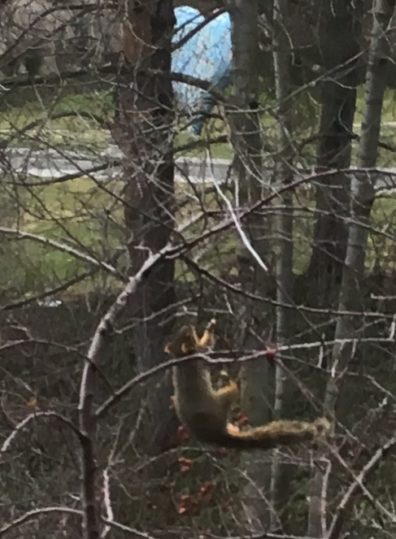by Barbara Aston
As I sit at my desk here in French Administration, my window looks out on several trees, evergreen and crabapple trees. The ground and trees are lightly blanketed with a skiff of snow. The crabapple trees are bare of their leaves, but still retain their small dried fruits on their limbs. I watch as a squirrel grips a branch while it pulls at one of the dried crabapples. This squirrel has been busy for many days, gathering food and munching away. It wraps its tail close along its back, sheltering from the cold, or uses it to balance. One morning I witnessed three squirrels racing about and chasing one another until one dominated, claiming the tree as its territory.
For millennia we have observed and communed with our relatives in nature and their gentle, sometimes fearsome, spirits. Those that stand firm or stationary, such as the ground we stand on, and the trees, teach us of their strength and that which is stable, dependable, and true. With those that move about, we observe their focus on their task at hand, their awareness to their surroundings, their resiliency, and their beauty – their being-ness. If we take this time, we learn from them, slow the hurried activity that can fill our days, and hopefully let a sense of gratitude and wisdom regarding our place in the whole grow within us.
It is through our observations and our communing that we learn of the natural laws, the laws that have governed our Native peoples. This represents an educational path that we must not lose sight of and continue to pass on to our children and our grand-children. In higher education, we need to embrace and support these ways of knowing as foundational to who our students are as indigenous peoples. Higher education can provide a set of tools for understanding others and the world we live in (both natural and built), and for asking questions and seeking answers. We strive to assist our students in interpreting this knowledge through the lens of tribal traditions for how it may apply or be useful, but not as a replacement. We will continue to strive through our Tribal Nation Building Leadership Program and all of our programmatic services to hold up the traditional ways of the people and to celebrate them.

We are currently in the middle of searching for individuals to join our staff in this important work through the roles of Outreach Coordinator and Retention Specialist. We have narrowed the pool and will begin interviewing in the coming weeks. We look forward to introducing our new staff to all of you in the future and continuing to strengthen our support of students and of the university at large.
On another note, we held our annual Chili Cook-off with 6 entries. The winner was our own Faith Price with her moose and venison chili. I managed two votes for my “Classic” chili – it was actually Nalley’s – now I have given away my secret. I didn’t vote for myself either. 🙂
Have a blessed spring, and to our students, enjoy this time of your life with its challenges, struggles, and exciting adventures!